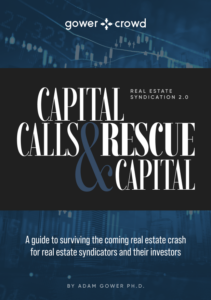The Stock Market Vs. Commercial Real Estate
Introduction
If you’re like many individuals today, this financial scenario will sound familiar.
You have money saved up that you’d like to invest, or already have money invested in the market. But the thing is, your broker or advisor has only ever spoken to you about two asset classes: stocks and bonds. (And maybe a few others, if you’re lucky.)
If you’ve never been exposed to the possibility of investing in commercial real estate, then it’s well worth your time as an investor to look at this unique and profitable asset class side by side with the more familiar world of the stock market.
While virtually everyone is familiar with the stock market as an asset class and a potential place to store their investment capital, many investors have simply never been exposed to commercial real estate as a viable option for investment.
So let’s examine what’s unique about commercial real estate, reasons to invest in it, and how it can help you grow your wealth and access returns you would’ve otherwise missed out on in your investment career.
Get access to our FREE weekly newsletter exclusively covering the latest updates from the real estate crowdfunding world
Matching Perks Aren’t Always Available
Many investors invest in the stock market because their employers have 401(k) matching programs. Usually there is an annual limit imposed, past which you’re free to keep contributing but your contributions will no longer be matched. Most of the time, these matching programs are only available through the traditional financial markets (stocks, bonds, etc.).
This is undoubtedly a strong incentive for many investors to develop exposure to the stock market in their investment portfolios. But matching employer perks aren’t always available.
Maybe you’re self-employed and run your own business. Or maybe you’ve maxed out the annual 401(k) contributions your employer is willing to match, and you’re looking to diversify your assets.
If you find yourself in a situation such as this, you should consider expanding your investment portfolio to include commercial real estate.
Commercial Real Estate Gives You More Influence Over Returns
Investing in the stock market is sometimes compared to gambling. While not entirely accurate, there’s an important truth in the comparison: both the casino and the stock market are environments in which money is put at stake, with very little possibility to individually influence one’s end results in terms of profits or losses.
Raise Profitability
Commercial real estate, on the other hand, offers many avenues through which you can directly control the profitability of your investment. For one thing, you can make many different improvements to your investment property that can raise its profitability.
Landscaping, interior and exterior paint, more attractive lighting, and many other factors can raise the value and returns of your commercial real estate investment.
You can also improve your real estate returns by doing your due diligence on an investment beforehand, and making sure that your business goals for the building align with the financial trends and realities of the area you’re investing in.
For instance, if you’re in an area that has a large senior population, it might make sense to invest in a retirement home or a similar type of property. The idea is to match your investment to the needs of the market you find yourself in.
Do you need the insights of a seasoned real estate professional? We provide the knowledge, information, and training you need to implement fund-raising programs yourself. Check out GowerCrowd to learn more.
Avoid Transaction Costs & Hidden Fees
If you’ve been primarily invested in the stock market or other traditional asset classes for most of your financial life, you might not have considered the issue of transaction costs and fees in much depth. But they add up quickly, so it’s worthwhile to spend a moment examining them more closely.
Let’s do a quick review of the most common transaction fees and costs you could be paying your broker without even being aware of it, as some fees are only explicitly stated in the fine print.
1. Trading Fees
Trading fees are also known in the financial industry as “commissions”. They are paid to your broker for his or her assistance in setting up and electronically carrying out your requested trade for you.
2. Brokerage Fees
Your brokerage may charge you fees for many different services associated with holding your investment account. A few different examples include: annual fees, monthly charges for account management, fees for account inactivity if you don’t trade for an extended period, and fees to transfer or close your account, among many others.
3. Advisory Fees
Many brokerages also offer advisory services for an additional annual fee, usually calculated as a percentage of your account size with the firm.
4. Expense Ratio
Mutual funds and ETFs are two offshoots of the stock market that are extremely common investments today. Expense ratios are charged on an annual basis by the mutual fund or ETF for the ability to own, buy, and sell shares of that particular investment.
Keep in mind that these are just a few of the more common fees and trading expenses associated with the stock market. You’re likely paying many more fees than you’re presently aware of. It would be well worth your time to comb through your paper or digital statements from your brokerage and break down exactly what you’re paying in fees each year.
Diversifying your portfolio through exposure to commercial real estate can be a very effective way to keep the fees you’re paying throughout the lifespan of your portfolio to a minimum. And this should be one of your general long-term goals in any asset class.
It’s important to note, of course, that commercial real estate investing has its own associated set of fees and costs, but many of them can be written off during tax season or deferred through savvy investing.
Recurring fees and charges can add up to tens or even hundreds of thousands of dollars lost over years and decades, both in their own right and when you factor in the potential profits you might have gained if you had been free to invest that capital instead. So remember: keep your fees low.
Commercial Real Estate Carries Tax Advantages
Along with reducing your annual fees and charges as much as possible, another long-term goal of any investor’s career should be to reduce their taxes as much as possible.
Commercial real estate investing carries several important tax advantages that don’t apply to stocks, bonds, mutual funds, and other similar asset classes. Let’s briefly review them.
1. Depreciation
The IRS has set the official “useful life” of a commercial property at 39 years, so depreciation on the asset is based on that figure. For every year that you own it, you can write off 1/39th of its total price as a deduction for depreciation.
Depreciation is an especially valuable tax benefit, because it’s what’s known as a non-cash expense. This means that you accrue valuable tax savings on an annual basis, but haven’t technically paid anything to get them.
You will eventually have to pay taxes on the sum total of money that you previously wrote off for depreciation when you sell the property. This is known as the depreciation recapture tax. But it’s still an overall benefit, because the depreciation recapture tax rate tends to be lower than income tax rates and other varieties.
2. 1031 Exchange
Even though you can’t completely avoid the depreciation recapture tax, you can defer it using what’s called a 1031 exchange. In commercial real estate investing, a 1031 exchange allows you to defer paying capital gains taxes and depreciation recapture taxes when you sell your investment property.
There are some caveats to this to be aware of though. The IRS only allows 1031 exchanges if you use the proceeds from the sale of your property to invest in the same type of asset (also called a “like-kind investment”). Additionally, there is a time limit of 180 days to engage in a 1031 exchange from the date you sold your original property.
Many investors will purchase and sell a property, then use the profits to upgrade to a larger and more profitable investment. In the real estate industry, this is known as “trading up”.
When the IRS finally does charge you capital gains taxes and the depreciation recapture tax upon the sale of your property, it will be based on the smaller, original property. Investors can do this multiple times, meaning the cumulative effect on your profits can be quite large if you invest strategically across time.
3. Interest Expense
Most commercial real estate deals are financed through loans. When you purchase a commercial property, you’re able to write off the annual total of the mortgage interest on your loan against your earned income.
This can result in substantial savings during tax season, especially during the early phases of your loan repayment.
4. Your Beneficiaries Will Receive Tax Benefits
In addition to the tax benefits listed above, commercial real estate confers tax benefits on your beneficiaries if you happen to leave your real estate investments to your descendents or other beneficiaries in your will.
If someone inherits and then sells your property after your death, they will be able to engage in a 1031 exchange if they wish, enabling them to defer capital gains and depreciation recapture taxes.
Also, if you pass down your commercial property, your heirs will get what’s known as a “step-up” basis. This means that when they finally choose to sell, they’ll only pay capital gains taxes on the value of the investment when they inherited it.
If you leave your commercial real estate to others in your will, a “step-up” basis can be very profitable if the property appreciates between the time of being bequeathed and sold.
Insider Trading Is Allowed In Commercial Real Estate Investing
Insider trading has attained widespread negative connotations in the past few decades. The SEC defines insider trading as buying or selling a security while in possession of material, nonpublic information about the profit picture or potential of said security.
In the stock, bond, and other conventional investment markets, insider trading is highly illegal. It’s punishable by prison time, usually accompanied by fines that exceed the amount of the illegal trade, and sometimes restricted access or outright barring from the financial markets for a period.
Even celebrities like Martha Stewart have been convicted of it, and had to serve time in prison as a result. The appeal and allure of high profits can just be too much sometimes. However, did you know that the world of commercial real estate not only legally allows insider trading, but thrives on it?
In commercial real estate, “insider trading” is referred to as trading on “imperfect information”. And the best deals usually have it at their root.
After all, the entire concept is to purchase a property for less than what it is actually worth, based on you seeing more value or potential in it than its present owner does.
Maybe you plan on making renovations and raising rents. Or maybe you’re planning on converting the property into a restaurant or store that’s particularly profitable in that area, based on research you’ve done.
Whatever it is, you’ve observed something about the property or the socioeconomics of the surrounding area during your due diligence phase that has confirmed for you that the building is actually worth more than what you’re paying for it.
People crave that sense of investment certainty so badly that they’ll jeopardize their freedom for it in conventional investment markets. But in commercial real estate, insider trading is allowed and encouraged.
Final Thoughts on Commercial Real Estate
Final Thoughts on Commercial Real Estate
Diversifying into commercial real estate carries many different benefits: tax advantages, heightened control over your returns, portfolio diversification, and many others.
And with options such as online commercial real estate crowdfunding, the barrier to entry for this profitable asset class is lower than it’s ever been in history.
Do you need insights about real estate investing as it applies to real estate crowdfunding? We have everything you need. Check out any of the links below for more information.
Newbie
If you want to build your wealth and earn passive income from real estate investing and are looking at deals on marketplace platforms or through developers online, then I recommend you start by the 8 Key Financial terms so you can understand every deal you look at.
The 8 Financial Keys are not only a great way to get started, they are also essential to understanding how you’ll make money in any real estate deal.
You’ll learn the most important financial concepts you need to know in real estate investing that apply to every type of real estate no matter the asset class (office, industrial, residential, hospitality, retail).
Intermediate Investor
If you’ve got some online real estate investments under your belt already and are beginning to receive passive income checks each month, or have been paid off with profit – or (hopefully not) are finding that some deals are not quite panning out the way you expected, then check out this page for a wealth of free resources.
Here I cover everything from beginner all the way to very advanced real estate concepts.
You’ll find podcasts with developers, researchers, professors and other industry experts, detailed articles, and lots of videos, both short and long that are all easily searchable and totally free.
Advanced Investors
I am not shy about being straightforward about real estate investing; it is exciting, lucrative, and can help you build wealth and income as part of your investment portfolio, but it is not without its risks.
As an advanced investor you know this already, so I’ve put together a webinar for you that guides you through one of the most important components of real estate investing: Real Estate Contracts – reading between the lines.
This is advanced learning and based off conversations I had with three of the top real estate attorneys in the country, combined with my own personal experience. Access it here; it could be the most important webcast you watch all year.
RELATED ARTICLES
Real Estate Waterfall Outliers
Last Updated on December 16, 2023 by Dr. Adam Gower The Outliers of the Real Estate Waterfall World By Adam Gower Ph.D. When investing in a real estate project as a passive partner, cash distributions are calculated and made using what is called a ‘waterfall,’ most of which are structured according to reasonably uniform standards,…
READ MORE >507 – Max Sharkansky – Exploring the best and worst of multifamily real estate
Last Updated on May 26, 2023 by Dr. Adam Gower Max Sharkansky – Managing Partner, Trion Properties Multifamily Rollercoaster Subscribe to our YouTube channel here Max Sharkansky – Bull markets are driven by greed. Bear markets are driven by fear, and it is peak fear right now. In the latest episode of The Real Estate…
READ MORE >What is a REIT?
Last Updated on December 14, 2021 by Dr. Adam Gower FREE TRAINING What is Real Estate Crowdfunding? Learn how to build wealth and earn passive income in real estate while someone else does all the work. Learn More What is a REIT? By Adam Gower Ph.D. A common question that arises when investors first discover…
READ MORE >





